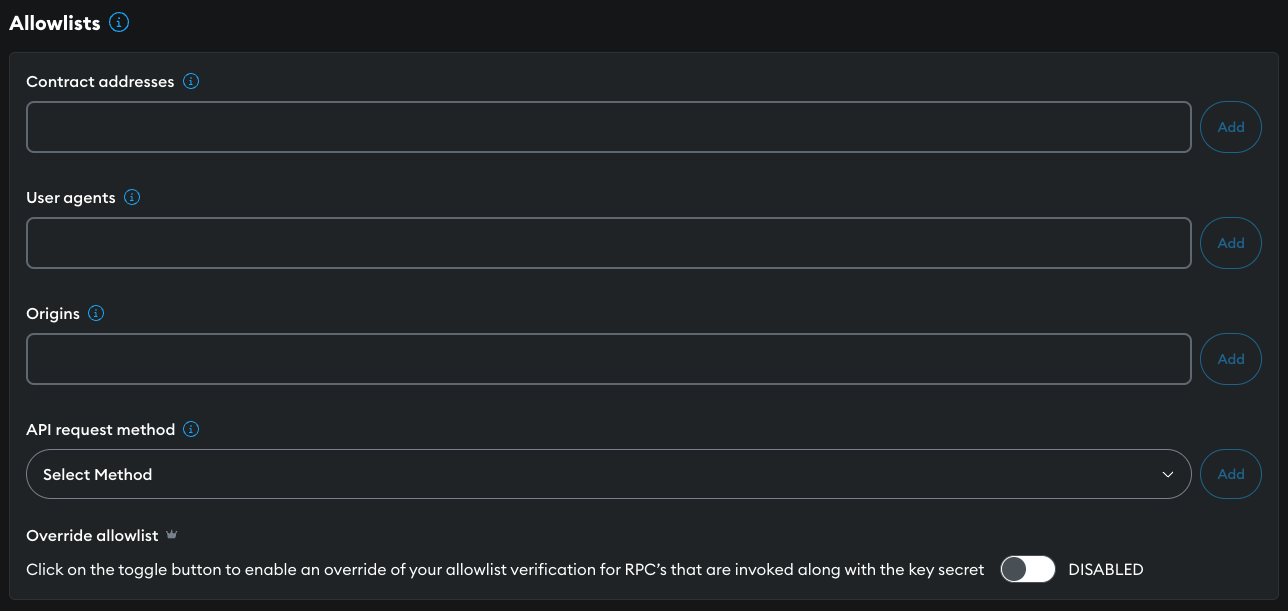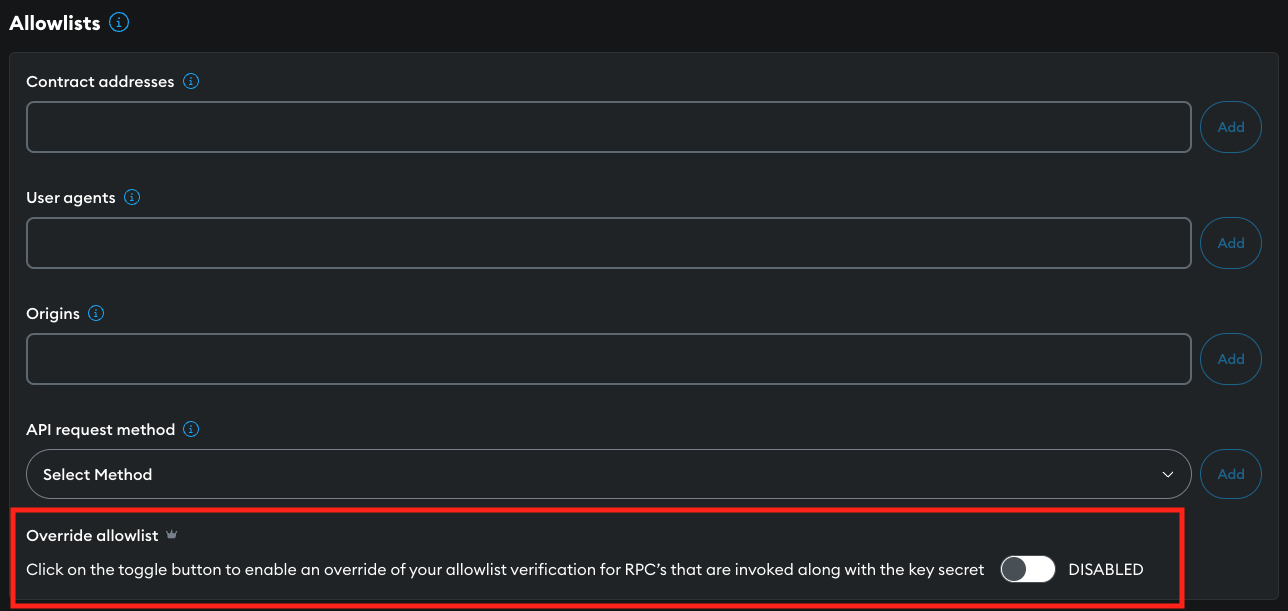Allowlists
Allowlists protect your API key from undesirable activity by restricting access to specific
addresses, HTTP headers User-Agent and Origin, and API request methods.
For example, if your dapp operates solely on the client side, your API key could be exposed to client-side risks, where malicious actors could access it through browser inspection tools or network monitoring.
Infura supports overriding your allowlist settings when you include an API key secret in requests. This allows you to apply the principle of least privilege on the client side while allowing unrestricted access on the server side.
Add the restriction details in the ALLOWLISTS section of your API key's Settings tab.

Allowlist behavior
- If an API key has no allowlists, all requests are accepted.
- When an API key has an allowlist definition, all requests must pass the definition.
- Each API key has a maximum of 30 allowlist entries per type.
- Each allowlist type is "AND"ed together.
- Multiple entries of the same type are "OR"ed.
Contract addresses
If your application only queries data from specific Ethereum smart contracts or addresses, add those addresses to the Contract Addresses allowlist.
Any requests which query addresses that aren't in the allowlist are rejected.
The following RPC methods take an Ethereum address parameter and are compatible with this type of allowlisting.
eth_calleth_estimateGaseth_getLogseth_getBalanceeth_getCodeeth_getStorageAteth_getTransactionCount
Example request
To allow a specific Ethereum address, input it into the Contract Addresses field and select Add.
In the following example we'll use 0xfe05a3e72235c9f92fd9f2282f41a8154.

You can test using a method that supports this type of allowlisting.
curl https://mainnet.infura.io/v3/<YOUR-API-KEY> \
-H 'Content-Type: application/json' \
-X POST \
-d '{"jsonrpc": "2.0", "method": "eth_getBalance", "params": ["0xfe05a3e72235c9f92fd9f2282f41a8154d6d342b", "latest"], "id": 1}'
Result:
{
"jsonrpc": "2.0",
"id": 1,
"result": "0x0"
}
User agents
To limit access to your application to specific user agents, add them to the User agents allowlist.
Find out more about the HTTP Header User-Agent.
When you add a User-Agent to an allowlist, any API requests originating from other platforms are rejected.
The User agents allowlist uses partial string matching, meaning if the string is present in the request's full User-Agent, it's registered as a match.
Example request
For example, to allow requests from Android phones alone, input Android into
the User agent field, and select Add.

Test with a call from a desktop terminal.
curl https://mainnet.infura.io/v3/<YOUR-API-KEY> \
-X POST \
-H "Content-Type: application/json" \
-d '{"jsonrpc": "2.0", "method": "eth_accounts", "params": [], "id": 1}'
Result:
{
"jsonrpc": "2.0",
"error": {
"code": -32002,
"message": "rejected due to project ID settings"
}
}
Origins
To limit access to your application to specific URLs, add them to the Origins allowlist.
Find out more about the HTTP Header Origin.
When you add an origin to an allowlist, any API requests originating from other origins are rejected.
Origin allowlists support wildcard subdomain patterns.
For example, allowlist entry https://*.example.com matches https://your-app.example.com,
https://our-app.example.com, and https://their-app.example.com, etc.
The origin scheme (HTTPS in the example above) is optional. However, if you include it, it must match.
An entry with only a scheme allows requests coming from that scheme alone.
Example request
To limit requests to your hosted Web3 application, input mydapp.example.com into the Origins
field, and select Add. Any requests that don't include Origin: mydapp.example.com are rejected.
API request method
To limit the methods allowed, select them from the API request method drop down.
If the list isn't empty, any method calls not specified in the list are rejected.
Override your allowlist settings
This functionality is only available to customers on the Developer tier or higher. You'll need to upgrade your plan if you're currently on the free Core tier.
The OVERRIDE ALLOWLIST switch lets you override your allowlist settings when a request includes an API key secret. This means requests will be accepted even if an IP address or URL isn't on your allowlist, provided they include both the API key and the API key secret.

This feature provides the following benefits:
-
Principle of least privilege on the client side - On the client side of your dapp, you may wish to limit the actions possible with your API key to only those necessary for the application's functionality. Allowlists ensure the API key is used solely for authorized locations, smart contract addresses, or methods.
-
No restrictions server side - On the server side, where the API key secret can be stored securely, you might need to carry out a broader range of actions without the constraints of allowlists. Using the API key secret allows you to circumvent these restrictions, giving your server-side application unrestricted use of the API key.
Best practices
- Ensure the API key secret is not exposed publicly, and include it in your requests.
- Use all allowlist options wherever possible.
- Create a new API key for each application. This allows you to allowlist the contract addresses relevant to that application.
- Avoid committing your project keys to a repo by using a package like dotenv.
If your dapp runs on the client side only, your API key will be exposed within client-side code. Consider creating a server component to secure your keys.